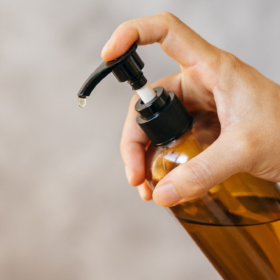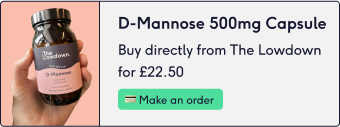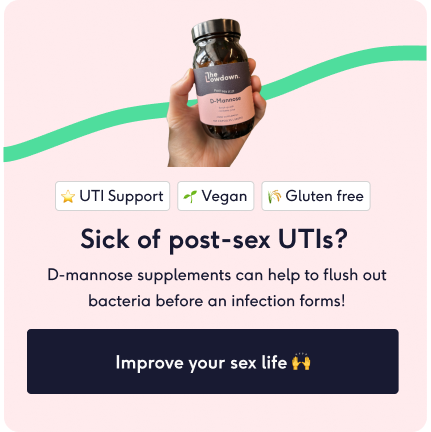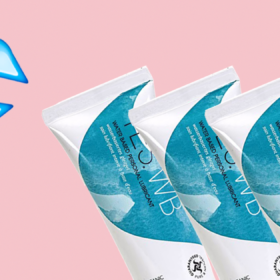
How to use lube: the do’s and don’ts
In this article
What's the lowdown?
There is no manual on how to use lubricant the right way, but you should avoid ingesting it unless the packaging says it’s safe to do so
Avoid silicone-based lubricants if you use silicone sex toys
Oil-based lubricants can damage and even break condoms
Water-based lubricant will wash away in the shower, but is easier to clean off and won’t stain your bed sheets
This post contains some affiliate links where we earn a small commission, but we only ever recommend products vetted by our team and doctors!
If you’ve never used lubricant before, the wealth of information about the stuff on the internet can feel pretty overwhelming. The truth, though, is that it’s surprisingly easy to use. Simply put, you just have to figure out which lube is right for you, get your hands on some and then, well… get down to it.
That being said, there are a few things that are helpful to know before using lubricant for the first time, so let’s run through some of the do’s and don’ts of how to use lubricant.
When to use lubricant
Lubricant can be used whenever the need arises – and even when it doesn’t. Whether or not you experience vaginal dryness or enjoy anal sex, it’s a myth that lube is restricted only to certain forms of physical intimacy. Using lubrication can increase female pleasure regardless of the type of sex you’re having, so if you’re asking whether it’s appropriate for your personal situation – it most likely is.
When not to use lubricant
There isn’t really a specific situation in which lubricant isn’t appropriate (although your great aunt’s 90th birthday party, for example, is probably not the ideal moment to whip out a tube). Lubricant is great for solo sex, penile-vaginal sex, anal-vaginal sex, vaginal-vaginal sex, and oral sex – in fact, research shows that female sexual pleasure improved across different types of sex when using lubricant compared to not using any at all. And just a quick reminder: sex should be comfortable (at a minimum!) for everyone involved, and you should never feel pressured into having sex that won’t feel good for you. If lube increases your enjoyment of sex, that’s the only reason you need to use it.
There are some caveats, though, particularly when it comes to the type of lubricant you use and the type of sex you’re having, so if you’re wondering how to use lubricant for the first time, we’ve got you covered.
How to use lubricant safely
Warm it in your hands first
It can be tempting to just apply lube directly to the area you want it, but it’s actually better to squeeze it into your hands first and rub them together to warm it through. This makes the lube closer to your body temperature, and will give you less of a shock than squeezing it on directly at room-temperature.
Consider your clean-up routine
It might not be what immediately springs to mind when you’re getting in the mood, but what you do post-sex is also important (bonus advice: pee as soon as poss to avoid a urinary tract infection). Both oil and silicone-based lubricants require soap to be removed, as they won’t just rinse away with water. Soap can be irritating to the delicate skin of the vulva and vagina, and can disrupt your vagina’s natural balance of bacteria, potentially leaving you more prone to thrush or bacterial vaginosis. This goes for intimate washes, too, by the way. If you have sensitive skin, it might be wise to opt for a water-based lubricant instead, which will rinse right off with some lukewarm water.

Shower sex
If you’re planning on getting water involved during sex, oil- or silicone-based lube is probably your best shot. Like we said earlier, water-based lube washes away with water, so won’t be much use in the shower. It is, however, safer in terms of slip risk. Oil- and silicone-based lubes can make surfaces very slippy, so be super careful when you’re using them in the shower.
Anal sex
The anus, unlike the vagina or mouth, doesn’t have its own natural lubricant. You’ll want to be extra generous when using lube for anal sex, and will want to apply it to both the outside and inside of the anus as well as onto whatever you’ll be inserting – be it a sex toy, penis or other body part.
Spare a thought for your bedsheets
If you’re particularly attached to your linens (or clothes, towels, or any fabric in your immediate vicinity, really) you’ll want to choose your lube wisely. Oil- and silicone-based lubricants can stain unless you’re careful not to spill – and really, what better way to ruin the mood than to request that involved parties please be mindful of your Egyption cotton duvet cover? Water-based lubes wash away and won’t leave a mark, so are definitely a better choice if you value your soft furnishings. Alternatively, you could lay a lesser-liked towel down to catch any potential stains.
Can you use lube when pregnant?
Yes, you can use lube while you are pregnant worry-free. Your cervix is shut tight during pregnancy and there is a thick mucus plug acting as a barrier and protecting your baby from external substances like germs or lube! Lube can increase sexual pleasure during pregnancy so have at it! If you are unsure, you can check with your OBGYN or midwife first for extra reassurance.
Lube alternative FAQs
Can you eat lube?
There are so many different brands of lubricant, with multitudes of added ingredients (some, for example, have benzocaine as an ingredient, which causes a numbing effect which aims to make sex last longer). Because of this, we can’t tell you whether a certain type – like water-based, for example – is safer to ingest than another. Generally speaking, ingesting a small amount of any personal lubricant shouldn’t cause anything more than a bit of tummy upset, but always check the packaging for more specific instructions.
Can you use Vaseline as lube?
Thanks to its presence in most people’s bathroom cupboards, Vaseline has landed itself a bit of a reputation for its lubricating properties. But that doesn’t mean you should use it during sex – it’s more irritating than other options, stains, can damage condoms and increases your risk of infection. With so many other choices out there, it’s best to steer clear of petroleum-based products, slippery as they may be. This also goes for other bathroom staples like shower gel, shampoo and conditioner! These products are for external use only and away from intimate areas.
Can you use lube with sex toys?
Silicone-based lubricants can interact with your silicone sex toys, causing them to degenerate over time. This degeneration makes the surface of the sex toy more porous, rendering it harder to clean and increasing your risk of introducing bacteria and infection into your body. If you’re looking for a lube that’s safe to use with sex toys, stick to water-based lubricants like, something like Yes Organics water-based lubricant ticks all the boxes – get it from Amazon!
Can you use baby oil as lube?
Please do not use baby oil as lube. It can cause skin irritation around your vulva and vagina and increase your risk of infections as it can disrupt your vaginal microbiome.
Another important thing, something that very few people know, but which (to us, at least) feels like a Pretty Big Deal. Oil-based lubricants cannot be used with condoms as they can damage their latex, sometimes even causing them to break. If condoms are your chosen contraception method, or if you’re using them to protect yourself against STIs, stay well away from oil-based lube, and opt for silicone or water-based instead.
By design, any lubricant causes extra slippage, so be careful with condoms in general – check regularly that they’re still properly in place and haven’t slipped off.
Can you use coconut oil as lube? Can you use olive oil as lube?
Same goes for coconut oil and olive oil, they are not suitable alternatives to lube. Avoid using them intimately on the vagina or penis and especially during penetrative sex. They are definitely the healthier oil choices but that does not make them suitable for internal use.
Can you use moisturiser as lube?
Many moisturisers contain fragrances, perfumes, and other ingredients that can irritate the skin, in particular the skin around our vulva and vagina as it is more sensitive. Furthermore, they tend to dry out quickly and will not provide the ‘wetness’ you need from lube.
Can you use aloe vera as lube?
You might find answers on Google suggesting that aloe vera is a good natural alternative to lube as it is water based and has a pH of 4.5 which matches the pH of the vagina. However, we would not trust these. Aloe vera has been tested for external use, offering cooling and healing properties, but has it been tested on our sensitive genital areas, definitely not. This is why we suggest not experimenting with aloe vera.
What is a safe lubricant to use?
When used correctly, lubricants are generally safe, but you should think about your own circumstances – like whether you’re using condoms or silicone sex toys – before you just pick a bottle off the shelf. If you’re looking for a great all-rounder, we highly recommend Yes Organics water-based personal lubricant. It’s pH balanced, moisturising and long-lasting, and really, what more could you ask for? Get it from Amazon.
We’ll only ever recommend products to you that we truly believe in, and this lube absolutely passes the test.

Our medical review process
This article has been medically reviewed for factual and up to date information by a Lowdown doctor.


